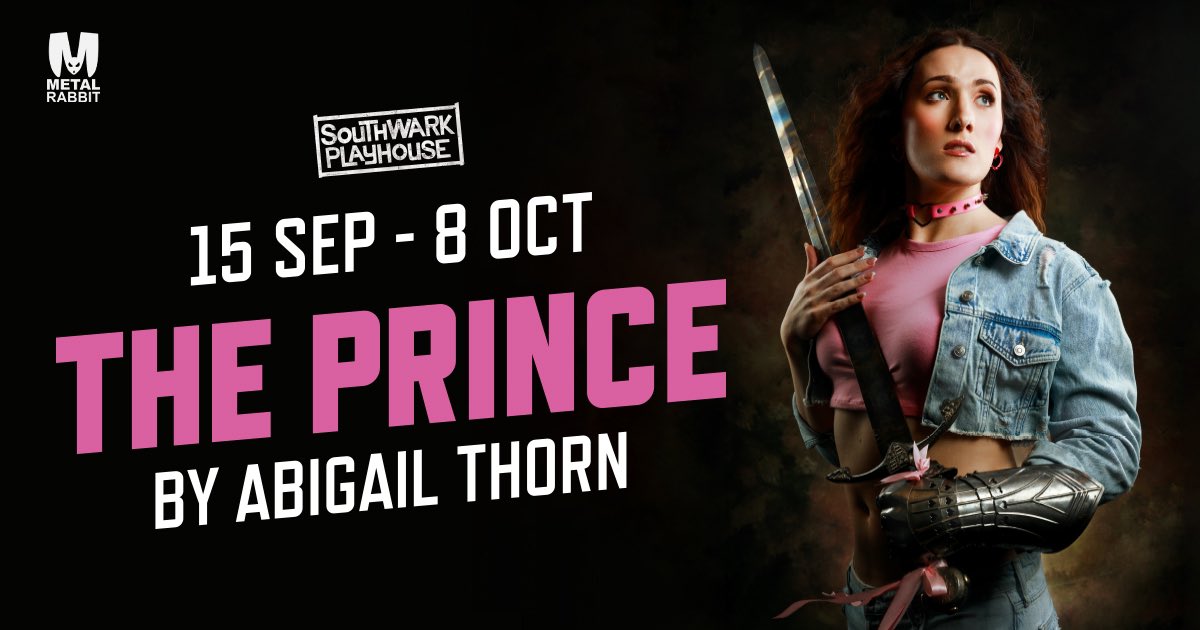Abigail Thorn is absolutely a friend of Trans Writes and has even contributed an essay on the idea of dysphoria which you can check out here. So there was no way we were not going to review her debut play; The Prince. Kestral Gaian writes:
Like many people in London on Thursday evening I put on a shawl, braced for bad weather, and joined The Queue… outside the Southwark Playhouse for the opening night of Abigail Thorn’s debut play The Prince.
As I enter there’s an image of Thorn on a large poster, wearing a combination of casualwear and medieval garb. This juxtaposition would go on to define the rest of my evening, on a road full of old buildings from the late 1800s, sat in a much-moved theatre, containing one of the freshest, most inclusive new plays I’ve seen in recent years.
My debut play, The Prince, opens on Thursday! I can’t believe it’s finally being performed, and I’m so glad to have this amazing cast and crew backing me up! ⚔️👑 pic.twitter.com/Go1mligF2s
— Abigail Thorn (@PhilosophyTube) September 10, 2022
The stage is like a three-dimensional chess set with the audience on all sides and an array of fluorescent tubes hanging from the ceiling above. There’s obvious chatter and anticipation from the audience, as a packed house admires the stage design of Lulu Tam and team. The lights dim, and on stroll the cast. The Prince begins.
The next 90 minutes, split into two 45-minute acts, are a whirlwind of relatable characters, sci-fi level mystery, and enough Shakespeare to entertain even the most enthusiastic of GCSE English students.
In The Prince we’re introduced to Sam (Joni Ayton-Kent), a trans woman trapped in a universe where fiction has become fact. Ayton-Kent manages to portray a character both confident and full of unease, something that feels familiar to folk like me who transitioned later in life. This mid-thirties uncertainty is contrasted brilliantly by the character of Jen (Mary Malone), a young and vibrant, yet rash and impulsive, trans woman who becomes Sam’s unlikely companion.
The Princes uses these two protagonists to draw the audience into a world that seems at odds with itself — an effeminate knight called Hotspur (Abigail Thorn) takes the stage with Elizabethan flair followed mincing prince Hal (Corey Montague Sholay), prejudiced King Henry (Che Walker), and calming mentor Worcester (Richard Rees).
It quickly becomes clear that we’re watching more than one story unfold. Sam tells a bewildered Jen of her escape plans whilst parts of a familiar Shakespeare play unfold around them. But then the very characters in the play themselves seem to have their own battles ongoing. Such as Hotspur, brilliantly played by Thorn, who seems to have a hard time being cast as a male role model for King and Country alike.
As Jen starts to meddle and becomes a chaotic hero seemingly destabilising Jen’s escape plans, the world around them starts to fall apart — quite literally — thanks to the clever use of minimal space by lighting and sound designers Rodent and Martha Godfrey.
The second act sees Hotspur, Hal, Lady Kate (Tianna Arnold), and Douglas (Tyler Luke Cunningham) break the fourth wall — possibly the fifth and sixth walls too — slipping from iambic pentameter to modern-day parlance with ease in a way that both added to the story and delighted the audience in equal measure.
Arnold, Montague Sholay, and Thorn all master this tightrope-walk of multiplicity in a way that shows a cast in complete sync, giving an already excellent script the professional debut outing that it deserves.
In one scene, almost all the cast cycle through multiple changes whilst on stage together, each switching body language and speech patterns entirely as they go. As the play draws to a close, we find ourselves laughing, crying, cheering, and applauding almost constantly. The three-minute ovation hardly felt like enough.
— The Prince (@ThePrince_play) September 10, 2022
I think Abigail Thorn deserves particular credit for her Lin-Manuel-Miranda-like way of creating a character that in many ways only she could do justice to. Her portrayal of Hotspur had me hooked from the start in an is-he-isn’t-she kind of way. The entire ensemble echo this ethos, really drawing me in to an incredible world supported by a crew that made one space and several centuries feel just an arms-length away.
Trans people have been making incredible art for years. Yet it seems that, in the past few years and despite increasing hostility, the fruits of our creativity are becoming more and more visible. We’ve had incredible and sensitive trans characters in TV shows, we’ve got innumerable books and stories in the world, and now we have The Prince.
On the bus home, I couldn’t quite work out what I was feeling. The ending — which I won’t spoil — was poignant and emotional. There was genuine comedy, air-punching honesty, and enough plot twists to keep me enthralled and, quite literally, on the edge of my tiny theatre seat. I pulled out my phone and sent a text to various queer group chats and friends — what I had just witnessed, I felt, was not a play to be missed.
This was Abigail Thorn’s first outing as a playwright, but you’d be forgiven for thinking it more like her magnum opus. The Prince is more than just a play. It’s a collection of allegories and cautionary tales, wrapped up in a mystery, sprinkled with Shakespeare, and dipped in a rainbow.
I can’t wait to see what this new generation of queer actors, writers, and theatre makers come up with next! Tickets for Abigail Thorn’s The Prince can be found via Southwark Playhouse’s website or by clicking the link in the tweet below.
👑THE PRINCE👑
First performance today! Jen and Sam are trapped… in a multiverse of Shakespeare’s complete works.Catch these brilliant folks playing now until 8 Oct 🎉 https://t.co/eJdLv1TKpz pic.twitter.com/BTOEPH5Az7
— Southwark Playhouse (@swkplay) September 15, 2022











